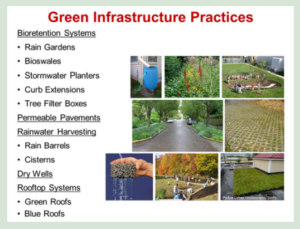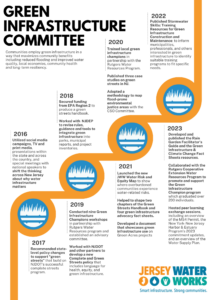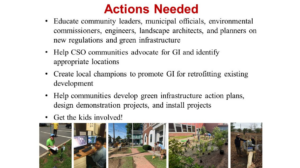10-Year Anniversary Series: Tracing Jersey Water Works activities to maximize green infrastructure implementation in all areas of the state.
Green infrastructure in Asbury Park, NJ. Photo courtesy of New Jersey Future.
INTRODUCTION
For the last decade, Jersey Water Works (JWW) members have advocated for a “green first” approach. This approach involves strategically educating about the benefits of green infrastructure, reviewing and promoting policy changes that facilitate implementation, and highlighting demonstration projects to showcase the neighborhood benefits impacting climate and health in all communities, especially in environmental justice communities.
JWW was founded as a collaborative initiative dedicated to utilizing the collective impact model to engage stakeholders in fostering systemic changes in the state’s water infrastructure. To further this mission, JWW established a Green Infrastructure (GI) Committee focused on promoting effective and beneficial green infrastructure projects. Communities that make the most of green infrastructure can experience advantages such as reduced flooding, improved water quality, economic growth, enhanced community health, and long-term resilience. JWW members advocate for community-driven and community-informed green infrastructure solutions to ensure they do not create new inequities in environmental justice communities already facing cumulative burdens like flooding, heat waves, poor air quality, and failing infrastructure.
The GI Committee, through its dedicated efforts in developing resources, raising awareness, and fostering partnerships with diverse organizations, has made a significant impact over the past decade. This collective effort, outlined in this brief report, showcases the involvement of JWW members in shaping decision-making around green infrastructure during the last ten years, making each stakeholder an integral part of the journey.
WHAT IS GREEN INFRASTRUCTURE?
Green infrastructure (GI) is a group of stormwater management strategies that enable stormwater and melting snow to soak into soils near where they fall, be filtered by vegetation, or be captured for beneficial reuse such as irrigation or flushing toilets. GI includes practices– such as rain gardens or bioswales, retention basins, and porous pavement–that treat stormwater at the source. Impervious cover–such as streets, roofs, and buildings– creates stormwater runoff that contaminates our waterways, such as fertilizer, gasoline, and road salt. GI reduces the quantity of stormwater runoff entering the storm sewer system by capturing it, diverting it into a naturalized system where it is filtered, or delaying stormwater release to improve water quality and reduce localized flooding. Green Infrastructure solutions can promote multiple benefits, such as reduced flooding and reduced heat, while providing opportunities for recreation and making the place more green. These benefits are vital, particularly for environmental justice communities, which often face cumulative burdens from flooding, heat waves, lack of open recreation spaces, and failing water and stormwater infrastructure.
Source: “So You’re A Green Infrastructure Champion, Now What? A Roadmap For Project Planning & Advocacy.” https://cms.jerseywaterworks.org/wp-content/uploads/2024/07/NJF_JWWMGIOutreach_V2.pdf, July 2024.

View full image here. “Rain Garden: Facilitator’s Guide – A Simple Way to Do Your Part, Faciliator’s Guide.” Jersey Water Works, February 2023, https://cms.jerseywaterworks.org/wp-content/uploads/2023/02/Rain-Gardens-A-Simple-Way-to-do-Your-Part-%E2%80%93-Facilitators-Guide.pdf.
MILESTONES
In 2016, the GI Committee published the Green Acres and Green Infrastructure report with recommendations for the New Jersey Department of Environmental Protection’s (NJDEP) Green Acres Program to allow green infrastructure in existing parks to address off-site stormwater with limitations, where doing so would not harm the purpose of the park. The committee also assisted municipal leaders in conducting water loss audits, asset management, and green infrastructure planning and implementation by creating new Sustainable Jersey “actions.”
“The Green Infrastructure Committee prepared step-by-step ‘actions’ for the 445 towns participating in Sustainable Jersey’s municipal certification program. With the varied expertise of the committee members, we developed a ‘how-to’ guide to help local teams plan and build green infrastructure projects. Their success not only helps them get certified but also improves water quality throughout our state,” notes committee co-chair Rob Pirani, program director at the NY-NJ Harbor & Estuary Program.”
JWW utilized social media campaigns, TV and print media, presentations within the state and across the country, and special meetings with national speakers to shift the thinking across New Jersey about why water infrastructure and green infrastructure matters.

Graphic created by Shweta Raman. View full image here.
In 2017, the committee members explored new best practices, including end-of-pipe disinfection and “CSO+” projects that reduce sewer overflows while also addressing other top city priorities that may offer access to nontraditional funding/financing options. They also recommended state-level policy changes to support “green streets” that build on the New Jersey Department of Transportation’s successful complete streets program.
In 2018, the GI committee secured funding from the US Environmental Protection Agency (EPA) Region 2 to produce a green streets handbook and worked with the NJDEP to revise rules and guidance for integrating green infrastructure into various areas. They also completed a first draft of a green infrastructure guide for private property owners and residents. The committee’s state-level policy recommendations to make green streets a mainstream practice in New Jersey were based on research and discussion with key stakeholders including state agencies. A few years later, the Department of Transportation published a report called Complete & Green Streets for all Model: Complete Streets Policy & Guide: Making New Jersey’s Communities Healthy, Equitable, Green & Prosperous, and the GI committee was acknowledged for their participation in developing the guide.
In 2019, the committee worked on developing a new Complete and Green Streets policy and conducted Green Infrastructure Champions workshops in cooperation with the Rutgers Cooperative Extension Water Resources Program. They also conducted a national survey of stormwater utility incentive programs for green infrastructure. This survey showed the importance of fee-based stormwater utilities in other states. That same year, the Legislature approved the Clean Stormwater and Flood Reduction Act, which allowed local government entities to create stormwater utilities and establish fees. With this enactment, New Jersey joined more than 40 states where stormwater utilities were already authorized, and several municipalities began work on feasibility studies.
In 2020, the committee members sent GI recommendations to NJDEP, trained local green infrastructure champions, and published case studies on green streets in New Jersey. They also adopted a methodology with the CSO Committee to map flood-prone environmental justice areas. In 2020, NJDEP updated the Stormwater Management Rules, requiring municipalities to have green infrastructure in major development projects.
In 2021, the committee launched the JWW Water Risk and Equity Map. This informational map helps to identify general patterns and trends of flooding and known water quality issues in the state, general demographic trends, and potential incidence of water-related risks in specific communities. They published a memo on how stormwater utilities can support green infrastructure. They also began drafting brochures and documents to showcase green infrastructure use and workforce training programs as an effort for green infrastructure champions and local leaders to continue promoting and educating the public and elected leaders on the benefits of green infrastructure.
During that year, we also saw regulations requiring all major developments to use green infrastructure to comply with the New Jersey Stormwater Regulations.
In 2022, the committee published several fact sheets and resources to promote green infrastructure, educated the public about its benefits, and worked on developing educational modules and promoting the Water Risk and Equity Map tool. The Environmental Policy Innovation Center (EPIC) awarded the Water Data Prize (Equity category) to Jersey Water Works (JWW) and New Jersey Future (NJF) for their development of the New Jersey Water Risk and Equity Map and Jersey WaterCheck.
After years of advocacy by many member organizations, in 2023, New Jersey saw changes to the NJ Stormwater Management Rule that requires the use of climate-informed data for all major developments to protect our water, people, and economy. During that year, the committee created and published the Rain Garden Facilitator’s Guide and the Green Infrastructure & Climate Change Fact Sheets resources. Additionally, they raised awareness about green infrastructure statewide by organizing various events and peer learning exchange sessions. The committee collaborated with the Rutgers Cooperative Extension Water Resources Program to promote and support the largest Green Infrastructure (GI) Champion program to date, which saw over 200 individuals graduate in May. As of now, the GI Champions have trained more than 600 persons. In addition, the Climate Resilience and Green Infrastructure Committees reviewed and commented on NJDEP’s Strategic Climate Action Plan.
From the regulation side, the Stormwater Management Regulations (N.J.A.C. 7:8) were adopted in February 2004. Since then, they have been amended multiple times:
- March 2, 2021: A revised set of rules took effect that included requirements for stormwater management on existing impervious surfaces, infiltration of a specific volume of stormwater, and reduced “maximum contributory drainage areas”.
- July 2023: New rules were adopted as part of the Inland Flood Protection Rule. The revised rules took effect on July 16, 2024, and require Stormwater Best Management Practices (BMPs) to manage runoff from both current and future storms. Municipalities are required to update their local Stormwater Control Ordinances (SCOs) to reflect the changes.
In 2024, a special GI Champion in-person meeting took place during JWW’s membership meeting. Participants got insider tips on public education and outreach programs to help the municipality satisfy NJDEP’s Municipal Separate Storm Sewer System (MS4) Permit Requirements.They also met to learn how to help their municipality meet its MS4 Permit Requirements with its Watershed Improvement Plan. Prior to the meeting, the committee published the So You’re a Green Infrastructure Champion, Now What? A Roadmap for Project Planning & Advocacy resource to provide Green Infrastructure Champions the context they need to work with their municipalities and help achieve the goals of the NJ Municipal Separate Storm Sewer System (MS4) permit in their community.

View full image here. Slide from 2023 Membership Meeting, presented by Dr. Chris Obropta, Rutgers Water Resource Program.
Also, in 2024, the GI and Climate Resilience Committee are reviewing the proposed amendment to the Resilient Environments and Landscapes (REAL), which is part of the New Jersey Protecting Against Climate Threats (NJPACT) initiative directed by Governor Phil Murphy’s Executive Order 100 (Jan. 2020). “Through amendments to existing land resource protection rules, if adopted, REAL will bolster our resilience to the unavoidable impacts of climate change. The proposed rules address sea-level rise, coastal storm surge, flooding, and stormwater management concerns while improving water quality, protecting natural resources, and streamlining permitting processes that will expedite resilient investments in New Jersey’s communities and economy.” Many aspects of the rule amendments increase the opportunities to consider nature-based approaches.
As we continue our work, Jersey Water Works is keeping tabs on new projects by member organizations such as:
- Rain Ready: Newark Water and Sewer Department: RainReady Newark is the City of Newark’s Department of Water & Sewer Utilities’ green stormwater infrastructure (GSI) program. Designed to increase the city’s resilience to stormwater, the green infrastructure program uses natural processes to capture, filter, absorb, and reuse rainwater and snowmelt. https://www.rainreadynewark.org/
- Camden Coastal Resiliency Project: The Center for Environmental Transformation (CFET) is developing a community-based, evidence-backed Coastal Resiliency Master Plan for Camden to reduce the impacts of flooding on our neighborhoods and communities.
- Building Climate Ready New Jersey: Rutgers University researchers will lead green infrastructure, community engagement, K-12 education and planning initiatives as part of a $72.5 million federal grant. This includes ‘green infrastructure’ initiatives in Newark, Paterson and Perth Amboy
- Sustainable Jersey Green Teams: The Sustainable Jersey program includes nearly 400 Green Teams. Each Green Team represents a municipality in New Jersey that is registered with Sustainable Jersey. Green Teams provide the leadership to develop plans, implement programs and assist with educational opportunities that support the creation of a sustainable community.
The Jersey Water Works collaborative has been instrumental in promoting green infrastructure and empowering individuals to advocate for it in their communities, influencing green infrastructure policies and practices. However, more work remains to be done.
“There is a shift across the state in embracing green infrastructure,” says Rosana Pedra Nobre, New York – New Jersey Harbor & Estuary Program, Hudson River Foundation, GI Committee Co-Chair. JWW played a role, “whether small or large, in supporting (and sometimes nudging) that shift.”
To learn more about the Green Infrastructure Committee, click here: https://www.jerseywaterworks.org/committees/green-infrastructure-committee/